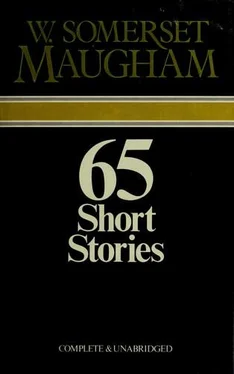Somerset Maugham - Sixty-Five Short Stories
Здесь есть возможность читать онлайн «Somerset Maugham - Sixty-Five Short Stories» весь текст электронной книги совершенно бесплатно (целиком полную версию без сокращений). В некоторых случаях можно слушать аудио, скачать через торрент в формате fb2 и присутствует краткое содержание. Жанр: Фантастика и фэнтези, на русском языке. Описание произведения, (предисловие) а так же отзывы посетителей доступны на портале библиотеки ЛибКат.
- Название:Sixty-Five Short Stories
- Автор:
- Жанр:
- Год:неизвестен
- ISBN:нет данных
- Рейтинг книги:4.5 / 5. Голосов: 2
-
Избранное:Добавить в избранное
- Отзывы:
-
Ваша оценка:
- 100
- 1
- 2
- 3
- 4
- 5
Sixty-Five Short Stories: краткое содержание, описание и аннотация
Предлагаем к чтению аннотацию, описание, краткое содержание или предисловие (зависит от того, что написал сам автор книги «Sixty-Five Short Stories»). Если вы не нашли необходимую информацию о книге — напишите в комментариях, мы постараемся отыскать её.
Sixty-Five Short Stories — читать онлайн бесплатно полную книгу (весь текст) целиком
Ниже представлен текст книги, разбитый по страницам. Система сохранения места последней прочитанной страницы, позволяет с удобством читать онлайн бесплатно книгу «Sixty-Five Short Stories», без необходимости каждый раз заново искать на чём Вы остановились. Поставьте закладку, и сможете в любой момент перейти на страницу, на которой закончили чтение.
Интервал:
Закладка:
'You men! You filthy, dirty pigs! You're all the same, all of you. Pigs! Pigs!'
Dr Macphail gasped. He understood.
The Fall of Edward Barnard
Bateman Hunter slept badly. For a fortnight on the boat that brought him from Tahiti to San Francisco he had been thinking of the story he had to tell, and for three days on the train he had repeated to himself the words in which he meant to tell it. But in a few hours now he would be in Chicago, and doubts assailed him. His conscience, always very sensitive, was not at ease. He was uncertain that he had done all that was possible, it was on his honour to do much more than the possible, and the thought was disturbing that, in a matter which so nearly touched his own interest, he had allowed his interest to prevail over his quixotry. Self-sacrifice appealed so keenly to his imagination that the inability to exercise it gave him a sense of disillusion. He was like the philanthropist who with altruistic motives builds model dwellings for the poor and finds that he has made a lucrative investment. He cannot prevent the satisfaction he feels in the ten per cent which rewards the bread he had cast upon the waters, but he has an awkward feeling that it detracts somewhat from the savour of his virtue. Bateman Hunter knew that his heart was pure, but he was not quite sure how steadfastly, when he told her his story, he would endure the scrutiny of Isabel Longstaffe's cool grey eyes. They were far-seeing and wise. She measured the standards of others by her own meticulous uprightness and there could be no greater censure than the cold silence with which she expressed her disapproval of a conduct that did not satisfy her exacting code. There was no appeal from her judgement, for, having made up her mind, she never changed it. But Bateman would not have had her different. He loved not only the beauty of her person, slim and straight, with the proud carriage of her head, but still more the beauty of her soul. With her truthfulness, her rigid sense of honour, her fearless outlook, she seemed to him to collect in herself all that was most admirable in his country-women. But he saw in her something more than the perfect type of the American girl, he felt that her exquisiteness was peculiar in a way to her environment, and he was assured that no city in the world could have produced her but Chicago. A pang seized him when he remembered that he must deal so bitter a blow to her pride, and anger flamed up in his heart when he thought of Edward Barnard.
But at last the train steamed in to Chicago and he exulted when he saw the long streets of grey houses. He could hardly bear his impatience at the thought of State and Wabash with their crowded pavements, their hustling traffic, and their noise. He was at home. And he was glad that he had been born in the most important city in the United States. San Francisco was provincial, New York was effete; the future of America lay in the development of its economic possibilities, and Chicago, by its position and by the energy of its citizens, was destined to become the real capital of the country.
'I guess I shall live long enough to see it the biggest city in the world,' Bateman said to himself as he stepped down to the platform.
His father had come to meet him, and after a hearty handshake, the pair of them, tall, slender, and well-made, with the same fine, ascetic features and thin lips, walked out of the station. Mr Hunter's automobile was waiting for them and they got in. Mr Hunter caught his son's proud and happy glance as he looked at the street.
'Glad to be back, son?' he asked.
'I should just think I was,' said Bateman.
His eyes devoured the restless scene.
'I guess there's a bit more traffic here than in your South Sea island,' laughed Mr Hunter. 'Did you like it there?'
'Give me Chicago, dad,' answered Bateman.
'You haven't brought Edward Barnard back with you.'
'No.'
'How was he?'
Bateman was silent for a moment, and his handsome, sensitive face darkened.
'I'd sooner not speak about him, dad,' he said at last.
'That's all right, my son. I guess your mother will be a happy woman today.'
They passed out of the crowded streets in the Loop and drove along the lake till they came to the imposing house, an exact copy of a chateau on the Loire, which Mr Hunter had built himself some years before. As soon as Bateman was alone in his room he asked for a number on the telephone. His heart leaped when he heard the voice that answered him.
'Good morning, Isabel,' he said gaily.
'Good morning, Bateman.'
'How did you recognize my voice?'
'It is not so long since I heard it last. Besides, I was expecting you.'
'When may I see you?'
'Unless you have anything better to do perhaps you'll dine with us tonight.'
'You know very well that I couldn't possibly have anything better to do.'
'I suppose that you're full of news?'
He thought he detected in her voice a note of apprehension.
'Yes,' he answered.
'Well, you must tell me tonight. Good-bye.'
She rang off. It was characteristic of her that she should be able to wait so many unnecessary hours to know what so immensely concerned her. To Bateman there was an admirable fortitude in her restraint.
At dinner, at which beside himself and Isabel no one was present but her father and mother, he watched her guide the conversation into the channels of an urbane small-talk, and it occurred to him that in just such a manner would a marquise under the shadow of the guillotine toy with the affairs of a day that would know no morrow. Her delicate features, the aristocratic shortness of her upper lip, and her wealth of fair hair suggested the marquise again, and it must have been obvious, even if it were not notorious, that in her veins flowed the best blood in Chicago. The dining-room was a fitting frame to her fragile beauty, for Isabel had caused the house, a replica of a palace on the Grand Canal at Venice, to be furnished by an English expert in the style of Louis XV; and the graceful decoration linked with the name of that amorous monarch enhanced her loveliness and at the same time acquired from it a more profound significance. For Isabel's mind was richly stored, and her conversation, however light, was never flippant. She spoke now of the Musicale to which she and her mother had been in the afternoon, of the lectures which an English poet was giving at the Auditorium, of the political situation, and of the Old Master which her father had recently bought for fifty thousand dollars in New York. It comforted Bateman to hear her. He felt that he was once more in the civilized world, at the centre of culture and distinction; and certain voices, troubling and yet against his will refusing to still their clamour, were at last silent in his heart.
'Gee, but it's good to be back in Chicago,' he said.
At last dinner was over, and when they went out of the dining-room Isabel said to her mother:
'I'm going to take Bateman along to my den. We have various things to talk about.'
'Very well, my dear,' said Mrs Longstaffe. 'You'll find your father and me in the Madame du Barry room when you're through.'
Isabel led the young man upstairs and showed him into the room of which he had so many charming memories. Though he knew it so well he could not repress the exclamation of delight which it always wrung from him. She looked round with a smile.
'I think it's a success,' she said. 'The main thing is that it's right. There's not even an ash-tray that isn't of the period.'
'I suppose that's what makes it so wonderful. Like all you do it's so superlatively right.'
They sat down in front of a log fire and Isabel looked at him with calm grave eyes.
'Now what have you to say to me?' she asked.
'I hardly know how to begin.'
Читать дальшеИнтервал:
Закладка:
Похожие книги на «Sixty-Five Short Stories»
Представляем Вашему вниманию похожие книги на «Sixty-Five Short Stories» списком для выбора. Мы отобрали схожую по названию и смыслу литературу в надежде предоставить читателям больше вариантов отыскать новые, интересные, ещё непрочитанные произведения.
Обсуждение, отзывы о книге «Sixty-Five Short Stories» и просто собственные мнения читателей. Оставьте ваши комментарии, напишите, что Вы думаете о произведении, его смысле или главных героях. Укажите что конкретно понравилось, а что нет, и почему Вы так считаете.









